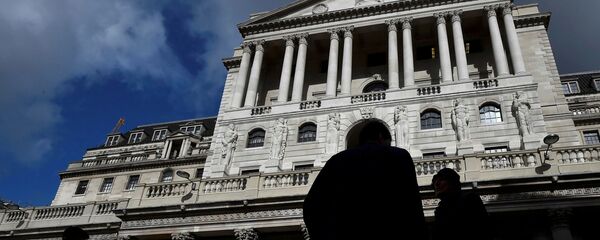The majority of British businesses will trigger contingency plans by March 2018 if no Brexit transition deal is struck, the Confederation of British Industry (CBI) has warned — and the organization's president has demanded the UK government end the Brexit "soap opera" to protect the country's economy.
Speaking at the group's annual conference November 6, CBI chief Paul Dreschler said the country needed "a single, clear strategy" — a plan for "what we want, and what kind of relationship we seek with the EU."
We need to get a move on with Brexit, says @drechsler_paul pic.twitter.com/8joLvX04HZ
— CBI (@CBItweets) November 6, 2017
He said current negotiations reminded him of a "prime-time soap opera, with a different episode each week," with "no doubt many exciting instalments to follow."
"Each one becomes the big story, until the next one rolls around. The effect is genuine steps forward such as the Prime Minister's Florence speech don't get the recognition they deserve. Time is of the essence. We must leave behind the episodic approach and take this opportunity to move forward as one — business and politicians, here and abroad," Dreschler stated.
Polling of the group's members — which runs to 190,000 businesses across the UK, collectively employing close to seven million — revealed 10 percent of businesses had already started moving staff or slowing recruitment as a result of the UK's decision to secede from the European Union, a third of firms had created an internal task force or group to monitor Brexit, and around 10 percent had hired an external firm to help them manage their response to the departure.
Hope and Optimism
Dreschler remained hopeful a fruitful agreement could be achieved, given parliament's "proud history of meeting unprecedented challenge with unprecedented co-operation" — such in the 1930s, after the Great Depression, and during World War Two, "under the great unifier, Sir Winston Churchill."
Today's @cbitweets data:
— Nicole Sykes (@NicoleSykes_) November 5, 2017
10% of firms w/ Brexit contingency plans have triggered them
25% will by Jan 1st
Another 25% by March 2018#peston
"We need that spirit again and we need it now. Just think what we could achieve if we do it right. A constructive and collaborative approach to Brexit would reassure millions in the UK and tell them that yes, we do want you to carry on contributing. It would make free trade deals quicker and easier to accomplish, and it would project an image of a strong, self-confident nation across the world," he said.
We're urging Gov't & the EU to work side-by-side with business to secure the best #Brexit deal. See #CBI2017 updates https://t.co/bIEjQoWEz9 pic.twitter.com/82x1sRPZ6o
— CBI (@CBItweets) November 5, 2017
Any deal struck should, he believed, allow businesses to grow, import and export easily, maintains current R&D (research and development) structures, and protect jobs, and people's ability to travel, and freedom to choose the life they want.
Financial Sector Jobs Forecast
The CBI's findings follow news in October that the Bank of England had forecast the UK could lose up to 75,000 financial services jobs in the years following its secession from the European Union in 2019.
The numbers were described as a "reasonable scenario," especially if no UK-EU financial services deal was struck.
Some financial institutions have already begun downsizing their UK operations, moving entire offices to the continent, or expanding existing operations in Europe. Frankfurt — Germany's financial and business center — has in particular established itself as the key alternative headquarters for banks and other financial institutions leaving the UK.
However, as the CBI chief indicated, it's not merely financial services firms looking eastwards — businesses of almost every stripe will likely find it harder to export products and services to the continent, due to a loss of passporting rights and potentially single market membership, once the UK leaves the bloc.
Deep Impact on British Households
It's not merely big business that will suffer from Brexit — British households will inevitably be impacted if no deal, or a bad deal, is struck.
Research issued in November by the National Institute of Economic and Social Research (NIESR) indicates the uncertainty and turmoil unleashed since the June 2016 vote has already had deleterious implications for the average consumer, with households across Britain £600 (US$796) worse off.
Strong words on the effects of #Brexit on UK economy since the vote in the #NIESRreview commentary by @GarryYoung5 https://t.co/fX73Svya0V pic.twitter.com/Al55IQjiwh
— NIESR (@NIESRorg) November 1, 2017
The fall is attributable to a drop in real disposable income since the start of the year 2017, combined with increasing consumer costs, largely precipitated by the dramatic drop in the value of the pound.
The gloomy outlook for the UK is in stark contrast to generally improving conditions elsewhere around the world, where growth overall is expected to rise by 3.5 percent.
Despite this, the Bank of England opted to raise interest rates November 2, for the first time in a decade — the cost of borrowing has risen from 0.25 percent to 0.5 percent, a reversal of the emergency cut immediately after the Brexit vote.





